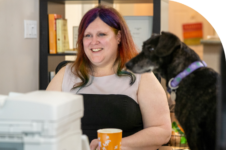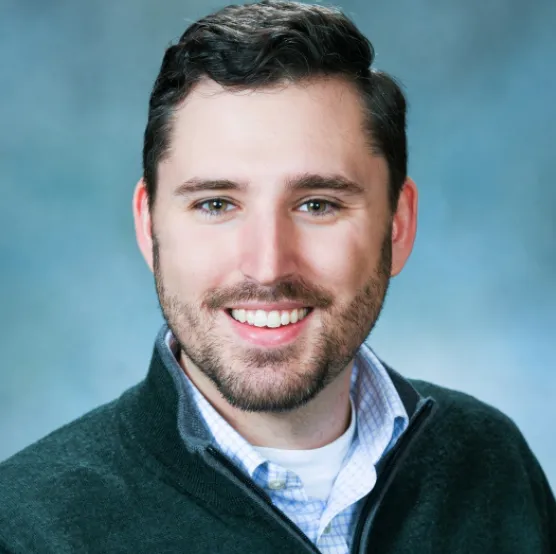Niching has the power to increase profitability and forge deeper connectivity with clients.

My Introduction to FreshBooks
My accounting firm, Abacus Hive, is a labor of love built around impact—our goal is to help communities. Instead of opening a generalized accounting firm, I decided to use my accounting skill set to push my community forward by niching in nonprofits and social enterprises.
As a CPA, I soon realized that one of the most important parts of my practice was aligning with successful technology providers. I landed on FreshBooks because of how user-friendly it is for clients—including customer support that actually has people answer the phone when clients need help. Working with nonprofits requires strong partnerships, and the emphasis on collaboration was a deciding factor for joining the Accounting Partner Program.
Deciding Where to Niche
Before I chose nonprofits and social enterprises, I did some soul-searching.
Both of my parents passed away before I hit my 30s. That experience made me acknowledge the ways that life is especially finite—and with such a limited amount of time, I wanted my impact to be a positive one. Working with nonprofits was the catalyst for achieving real change with the time I have, and the services I can offer.
Now I work with staff, board members, and directors with a shared passion, in the same niche. It’s a great feeling to want to talk about your clients and all the good they’re doing in the world.
Niching, Growth, and Profitability
Historically, generalization was great for accounting firms—the clients these firms brought on were categorized by region instead of genre. Now, when clients choose an accountant, they want someone who’s an expert in a specific field to support their specific needs. Niching is the natural answer to this evolution. We have clients and staff all over the world—U.S., Madagascar, and Tanzania—but all in the same niche.
Profitability-wise, Abacus Hive serves an industry segment where we need to balance profit over purpose when being compared to generalized firms. We’ve done competitive bidding before, and taken over nonprofit accounts that were previously engaged with someone who didn’t know the complex requirements of nonprofit accounting. These clients went from paying $100 per month for generalized services to paying us $1,000 per month for our more specialized skill set.
Improving Client Trust
The best part about niching, from a client-experience perspective, is the ability to connect on a deeper level with our clients. This level of understanding around whatever nonprofit-related issue our clients are going through is even more important than the amount of experience we bring to the table.
For example, when we relate with nonprofit directors about how many hats they have to wear (hint, all of them), their faces light up. They don’t have to explain the why or how—we already get it.
When you niche your firm, the trust is built in. A client has never once asked me, “Can you prove to me that you’re an expert with nonprofits?” Niching has established our expertise and built immediate trust with clients—trust that comes from knowing the ins and outs of their particular industry.
Things to Keep in Mind Before You Niche
Don’t Rush Into It
If you’re considering niching—and I think you should—do it on your own timeline! Let passion help drive your choice of niche, but don’t feel like you have to make that choice immediately.
A lot of accountants feel like if they’re going to niche, they have to make that decision right away. If you haven’t worked within several different types of industries, do that first and see what speaks to you.
There are leaders out there who say, “Niche now or go home.” That’s just not the case. Find your balance and don’t give in to market pressures concerning your personal timeline, just start making incremental progress.
Don’t False Advertise
When Abacus Hive was starting out, we were more generalized and took on a few tax clients. Accounting professionals that niche in tax are experts in that field because they keep up-to-date on every code change. Pretty quickly we referred a lot of that business out because we wanted clients to be best served by a more experienced tax expert.
The same concept applies when talking about niching in any space—you need to be the expert for what your client needs. I’ve often found that CPAs can be overly confident in their abilities.
For example, if an accounting firm has one nonprofit client out of 100, the firm will advertise that they specialize in nonprofits. One client does not make you a specialist. Abacus Hive works almost exclusively with nonprofits and social enterprises, and we’re still learning about the industry every day.
Niching vs. Hyper-niching
Once you’re confident in your niche, don’t be afraid of hyper-niching!
Within our nonprofit niche, we’ve honed in on 501(c)(3) charity-based nonprofits. When you get good at niching, you can get hyper-focused.
To take it a step further, our firm could hypothetically focus on 501(c)(3) charities that are exclusively animal shelters. There are probably 20,000 of those nationwide, and we would be the top-choice accountant for all of them.
Niching and hyper-niching also helps position your firm from a marketing perspective.
Some accountants rely exclusively on referrals because it’s hard to market to such a general audience. Once you figure out your model and your niche, it’s a lot easier to define, identify, and attract a solid list of clients you love working with.
From Accountant to Coach
As specialists, we’re also able to offer higher value, industry-specific services to clients and provide ad-hoc consulting, advisory, and project-base work, including:
- Being an audit liaison. The goal here is to save the client time so they can focus on the mission of the nonprofit. If we can save them 20 hours on their annual audit, that’s 20 hours they can use to make a difference in the community.
- Consulting on technology implementation and tools that can improve their day-to-day financial processes. These changes replace work previously done manually by several staff members, saving the nonprofit valuable time.
- Coaching. I prefer the word coaching to advisory—it’s a much more personal, relatable term that describes the resources and support we offer. We help build up confidence so directors feel comfortable talking to board members. We coach clients on how to talk about financial statements, and relieve anxiety about financial hurdles or IRS notices. Our goal with coaching is to reassure clients that everything will be fine.
I believe the future of successful client relationships must be collaborative, and for this to work I need to be able to partner with clients on their daily accounting needs. This is what sparked my initial interest in FreshBooks. The user interface makes it easy for clients to take control of certain aspects of their finances while still allowing our team to help with advisory and technical accounting when needed.
Niching As an Extension of Myself
I always wanted to find a way to give back. Niching has allowed me to work exclusively with clients in a sector centered around making a positive impact. I provide support to nonprofits with practical, comprehensive knowledge, timesaving skills, and intentionality.
In turn, the nonprofits are able to focus on making an even bigger positive impact. It’s easy to think your business is going to fail if you niche, or that you’ll be missing out on a large pool of clients. A quote from Meredith Hill sums this up: “When you speak to everyone, you speak to no one.”
Choose an area that brings you joy, focus your energy there, and watch your accounting business grow.
about the author
John is the Principal and Founder of Abacus Hive. He’s a CPA who focuses on nonprofits, social enterprises, and community-minded small businesses. After being introduced to FreshBooks in 2019, he became part of the FreshBooks Pilot Firm Council. With his technical background in accounting, finance, and management information systems, he helps organizations of all sizes expand their positive impact on the world.

 Accountants: How to Determine the Best KPIs for Your Clients
Accountants: How to Determine the Best KPIs for Your Clients 5 FreshBooks Features Accountants Love
5 FreshBooks Features Accountants Love Why Your Firm’s Accounting Tech Stack May Be Hurting Your Client Experience
Why Your Firm’s Accounting Tech Stack May Be Hurting Your Client Experience



![Crack the Client Code: How to Discover the Hidden Wealth in Each Client [Free eBook]](https://www.freshbooks.com/blog/wp-content/uploads/2020/05/Crack_client_code_blog_Post_Image-e1618594341993-226x150.jpg.optimal.jpg)


